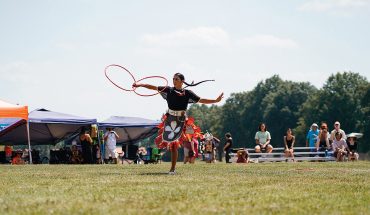
Outside the Raleigh Convention Center (from left) Andy Reisser from New Jersey, Jacob Gooding from California, Eric and his son Adam Larkey, from Tennessee, and Geoff Gay of Pennsylvania, meet and play an impromptu jam session at last year’s IBMA’s World of Bluegrass festival. photograph by Corey Lowenstein
by Tracy Davis
This month, as more than 150,000 bluegrass lovers converge on Raleigh for the International Bluegrass Music Association’s annual conference and the accompanying Wide Open Bluegrass festival, the city will be humming along to the music with a special kind of pride. Because bluegrass lives here now.
The grand-slam success of last year’s festival – and the accompanying International Bluegrass Music Association’s annual conference – encouraged the organization to wave goodbye to its former home in Nashville and extend its commitment to Raleigh from three years to six. As local bluegrass superstars Chatham County Line put it in the song they wrote for the occasion “with unbridled, kid-like, trembling excitement,” the music that was “born in Kentucky – and moved off to Nashville – is living in Raleigh now.”
How, exactly, did the City of Oaks out-music the Music City to lure the bluegrass community here? Dig around and you’ll find that it happened the old-fashioned way. Smart people combined vision with years of hard work, then shopped local for their secret ingredient: a uniquely Raleigh brand of Southern hospitality.
It started in 2006. In offices overlooking Fayetteville Street’s then-forlorn pedestrian mall on one side and a sea of construction (from which the Raleigh Convention Center would soon rise) on the other, civic-minded scheming was under way. The people who worked for the convention center and the Greater Raleigh Convention and Visitors Bureau had an idea. They wanted the IBMA to up stakes and head our way.
They knew that as conferences go, the IBMA is a plum. The nonprofit trade association has a globe-spanning membership, and its annual conference goes beyond the typical meetings-and-exhibits format to include a high-wattage awards show akin to a bluegrass Grammy Awards. It puts on late night musical showcases to get musicians in front of industry talent buyers, and maybe most exciting, it includes a multi-day “fanfest” for regular folks. There’s lots to like.
“We knew that hosting an event like this could cement Raleigh as a viable music destination,” says Laurie Okun, sales and marketing director for the convention center. “We don’t have a beach, we don’t have mountains. But we are cerebral and cultured and have a knack for creating uniquely Raleigh experiences together as a community.”
By 2007, Raleigh was courting the IBMA, but the group wouldn’t seriously consider Raleigh as a host until the convention center was up and running. That hadn’t happened yet. Like a frustrated young suitor who needed to show something more tangible than bright prospects, Raleigh kept making its case. Okun’s mindset was, “If we build it, not only will they come … they’ll come back.”
“There’s bluegrass fiber here,” says Loren Gold, executive vice president of the Greater Raleigh Convention and Visitors Bureau, in the form of musicians and fans. “We wanted to use that to introduce the IBMA and their music to more casual fans.” The next time the IBMA’s contract came open, Raleigh was ready. Convention center: Check. Convenient showcase venues and an auditorium for the awards show: Check. The brand new outdoor Red Hat Amphitheater as an extra bonus? Check. The IBMA said yes.
Municipal alchemy
Once Raleigh had the contract, it pulled in the nonprofit PineCone, long the backbone of Raleigh’s traditional music community, and created an all-volunteer local organizing committee of individuals and businesses willing to use their energy and connections to concoct a little municipal alchemy. The city already had the numbers part down, having tested and proven it with the NHL All-Star Game in 2011. It looked like this: Interesting Convention + City of Raleigh = Economic Success and Fun. The magic they wanted to bring? Gracious hospitality, shared Raleigh-style. If you went to the Wide Open Bluegrass street festival last year or took in a set during the IBMA’s Bluegrass Ramble, you saw it in action: an abundance of musical talent combined with our city’s special brand of graciousness and enthusiasm. A warm, generous, yes, ma’am embrace.
It started when organizers sought financial backing for the street festival. What they expected to be a tough sell instead was easy. The team asked PNC, Okun recalls, and found a receptive ally who “immediately saw the magic that we saw.” Making the street festival free and open to the public, says Rebecca Quinn-Wolf, PNC’s director of client and community relations, “was the perfect way for us to do that.”
Others gave of their time. “IBMA feels to me like a mash-up of a major music convention and a big ole homecoming party,” says PineCone volunteer Mark Tulbert, a local arts administrator. Between stints emceeing and helping with merchandise sales, Tulbert wandered among the impromptu jam sessions springing up all over downtown. A native of Union Grove, Tulbert says his first IBMA experience “brought back fond memories of home, where so many local folks came together to make the Fiddlers’ Convention happen every year.” He saw visitors enjoying the city, and locals like himself enjoying the moment. And, because hospitality is best served with barbecue sauce, others filled tables. Cackalacky sauce owner and creator Page Skelton, a bluegrass fan from childhood, happily provided backstage barbecue for musicians at the Merlefest artists’ showcase at Long View Center (now Vintage Church). “We were just doing what we do,” he says. “Today, it seems we’re conditioned to say no,” Skelton observes. “It’s becoming part of our culture to worry about something, or decline.” But passing up a chance to support both bluegrass and Raleigh in such a grassroots way didn’t occur to him. “Corny as it sounds,” he says, “it’s about having a moment in the sunshine.”
Same with Bill Landahl of Raleigh’s Oak City Coffee Roasters, who donated all of the coffee for the Merlefest showcase backstage and organized his own cadre of volunteers to serve it into the wee hours. “I love bluegrass,” he says. “And the chance to be part of something great going on in the city? That’s awesome.” Like Skelton, Landahl is a “say yes” kind of guy, so when he learned his coffee servers wanted to add something of their own, he encouraged them to add homemade treats to the backstage spread.
Little things, but they add up large. Trent Wagler is front man for The Steel Wheels,an Americana-bluegrass band so coffee-driven that there’s a roast named for them back in their Virginia hometown. Tracking down good late-night coffee in a town you don’t know can be an iffy thing, but Raleigh, Wagler says, came through. Here they found not only their java fix but also “the kind of thing that looked and tasted like a potluck, directly from someone’s kitchen.” In that, they found a fleeting sense of home.
Hearing this, musician Lynda Dawson nods. She gets it. Dawson leads acclaimed local bluegrass band Kickin’ Grass and was part of the vanguard effort to bring the IBMA to town. Asked if Raleigh’s IBMA experience is playing out as she hoped, she chews on the question for a moment. Dawson could say yes – fact is, it’s exceeded everyone’s highest hopes – but she’s thinking farther ahead, and along some deeper lines.
That’s because bluegrass, like hospitality, springs from time-honored traditions, yet Raleigh’s bluegrass experiment is a fresh and growing thing. She likes the lack of rigid expectations defining precisely how it should develop, and she hopes it’ll have the opportunity to do so in organic ways, responsive to what works well. “It’s like the city’s been brought up right,” Dawson says, “and knows how to give a value, and a space, to people who want to give of themselves and their talents.”
For more information and schedules, including the NC Whole Hog Barbecue State Championship, the Art Market presented by Artsplosure, and Got To Be NC food and craft beer offerings, go to wideopenbluegrass.com. Information on the conference is at ibma.org.




